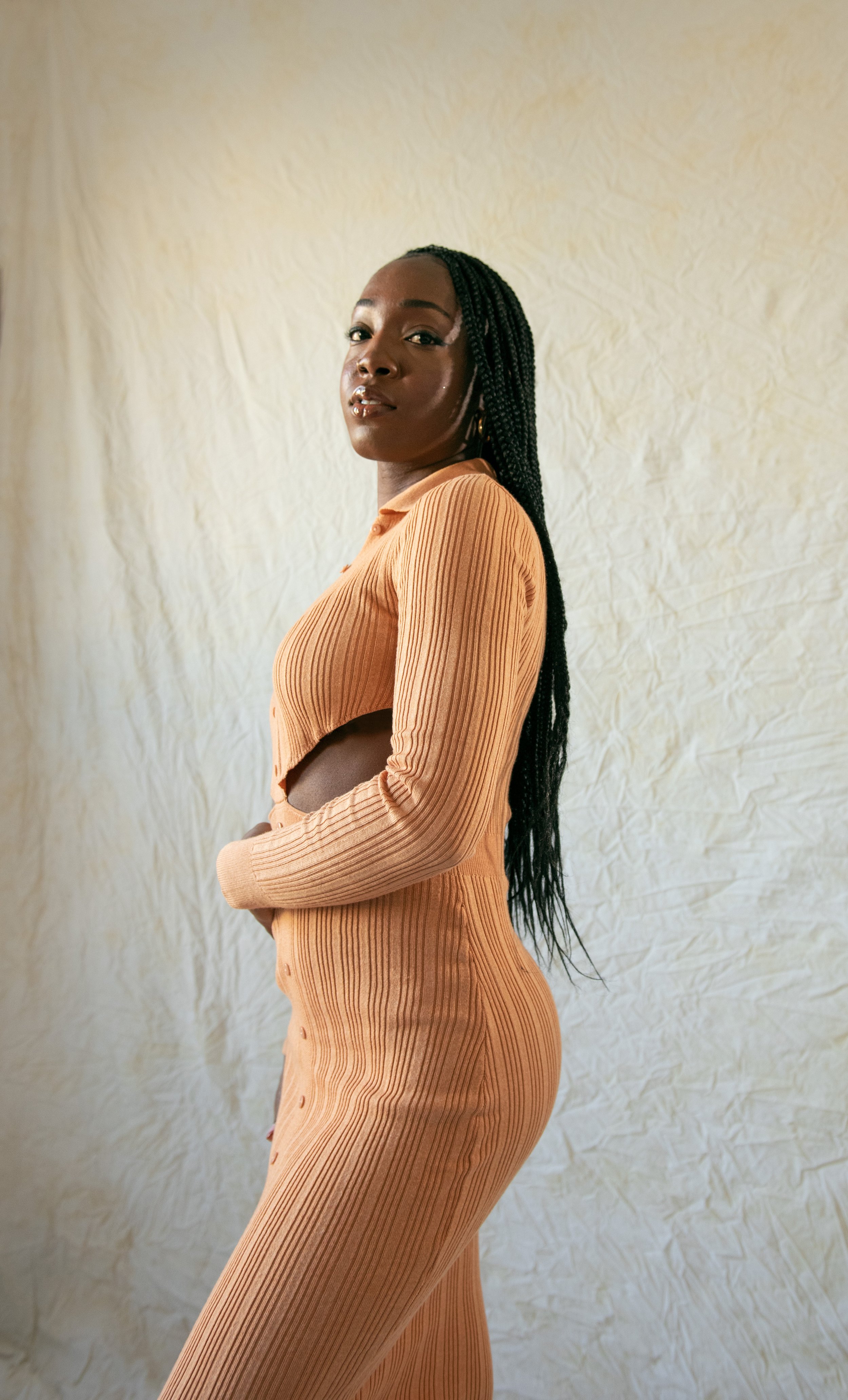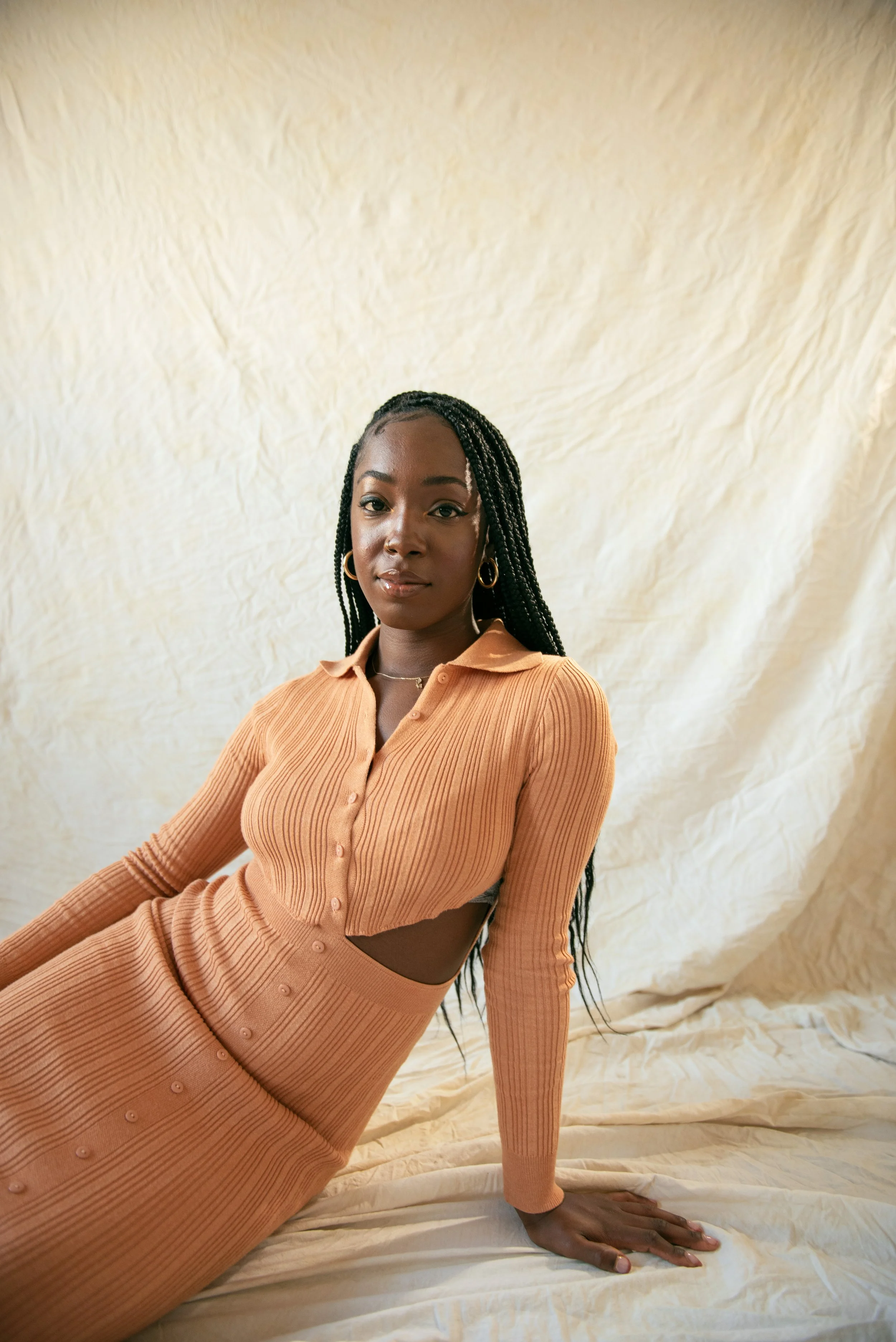How Keosha Love Uses Her Voice for Marginalized Communities
Photo: Roya DelSol
Multi-hyphenate Keosha Love uses her many platforms to amplify, advocate and make space for Black people. When logging into Toned’s Zoom room, Love admits that she’s a “little bit tired but feeling good.” The work of empowerment and advocacy is, indeed, exhausting yet rewarding. Love not only does this tireless, fulfilling work as an individual in her personal and professional life; she also heads Our Women's Voices, a nonprofit organization that uplifts women and makes social change through community organizing, arts and education. Toned spoke with Love about how she and her organization use multiple media to serve marginalized communities.
"Our Women's Voices started off as an online platform for women to just connect and share their stories with other women in the city. We eventually went from sharing and connecting with each other online to doing open mics, showcases, and panels," Love shares. "When we started having in-person events, I felt the community starting to become very strong, but we just needed more. There was a need for educational resources, more conversation and more action. That's when Our Women's Voices became a not-for-profit focused on amplifying women's voices and creating social change with women through art, organizing and education. We found those three things to be key."
Art is the primary pillar “because what got people together at first was open mics,” Love says. "People want to hear their stories through different art forms and media,” she says. In its organizing, Our Women's Voices has done work around gender and racial issues, hosting their own events or partnering with organizations like Not Another Black Life for its 2020 restorative justice healing circle. Education is "extremely important," Love shares. A recent example of the organization's educational efforts is the "Truthsgiving" festival, which Our Women's Voices hosted to recognize Indigenous resistance. When approaching educational initiatives, Love says it's important to ask, "How can we give people accessible knowledge? How can we provide a space for people to learn and unlearn their own biases and stigmas?" All of Our Women's Voices events and programming "are centred around low barrier drop-in, and anyone is welcome to participate."
Photo: Roya DelSol
“Our Women’s Voices started off as an online platform for women to just connect and share their stories with other women in the city. We eventually went from sharing and connecting with each other online to doing open mics, showcases, and panels.”
Our Women's Voices and its work are rooted in Love’s passions. Love is an award-winning multi-disciplinary artist, activist and educator empowering women and promoting positive health and mental wellness in communities of colour. Her work––including some collaborations with Nike, Facebook, the Toronto Raptors, the Art Gallery of York University and Never Apart magazine––"closely explores the diverse narratives and identities of Black and racialized people." An example is Black and Vulnerable, Love's interview series that amplifies Black stories and explores vulnerability, hosted on CBC's YouTube channel.
“Black and Vulnerable began as a visual diary that shared glimpses of my healing journey. I’m a psychology graduate, and I’ve always known about the huge gap in mental health and wellness resources in Black communities,” Love shares. “Mental health is still a taboo topic in a lot of Black families, and I wanted to normalize having conversations around our mental wellness.” When many people resonated with the visual diary and CBC asked Love to pitch something, Black and Vulnerable “just made sense,” Love says. “I really wanted Black communities to have a safe space to talk about trauma, access to therapy, healing and knowledge on how to reclaim the vulnerability that might have been robbed from us at an early age.”
Love's intention is very clear. On her website, she states, "Ultimately, I want to see women who have lived within the margins win. Everything I do is for them, for us. I want women who look like me to know it is okay to be loud, to take up space and take care of themselves first."
Love's work and mission have only expanded with Our Women's Voices. In five years, the collective has hosted over 40 events, brought together over 1,000 people, distributed $11,000 in grocery store gift cards to BIPOC communities, and given $10,000 to community leaders and artists. For this work, Our Women's Voices has earned awards like last year's DIY Space Initiative Award and the 2019 Community Award. The organization continues to pour into the community; it celebrated its five-year anniversary by awarding micro-grants to queer and trans creatives of colour and Black-owned businesses.
“ Ultimately, I want to see women who have lived within the margins win. Everything I do is for them, for us. I want women who look like me to know it is okay to be loud, to take up space and take care of themselves first.”
Photo: Roya DelSol
Our Women's Voices' virtual programming, brought on by the COVID-19 pandemic, has allowed the collective to reach even more people. "During the pandemic, our followers completely rose. As a result, we're seeing a lot more people engaged in digital space, engaged in digital events, engaged in platforms that are amplifying other people," Love says. The moment is reminiscent of the initiative's early days. "We started as an online platform," Love reiterates. "We were one of the first in the city, which I find really cool. Now, it's really rising."
Still, a digital world also leads to burnout and fatigue. Our Women's Voices is still in transformation, and "people get bored," Love says. "We're still trying to piece this organization together. We're still trying to build something bigger than ourselves. That sometimes creates pauses and breaks away from the platform to build it, which creates disengagement." Though Our Women's Voices has lost as many followers as it has gained, Love is not discouraged. "Everybody needs a break––even folks who are in these spaces, who are behind organizations. It's impossible to upkeep daily, so finding the balance is the point."
How does Love find balance, joy, and reprieve? Two things come to mind. "Binging is my favourite way to let go of every responsibility; it's a great mental escape. I'm rewatching a series I grew up watching called Boy Meets World, and it's giving me some joy right now. Going down that memory lane and not being tied to responsibilities is important for me," Love shares. "Another thing is healthy relationships––those that give back to me when I give to them. In a time when everyone's so busy, burnt out and exhausted, having friends, having a partner, having a support system that's strong, that you could talk to, that you could laugh with is so important. Those healthy relationships give me joy."
Love's parting words are a message to everyone: follow your passion. "Sometimes, we neglect our passions because we feel like they're not real, ideal or conventional. That creates a lot of unhappiness and lack of joy," she states. "I've learned in the past few years of my life that you have to go where your passion is. If you're passionate about travelling, do it. If you're passionate about teaching, do it. If you're passionate about art and writing, do it. If you're passionate about a person, do something about it. Go where your passion is because your passion is important and will give you fulfillment."



